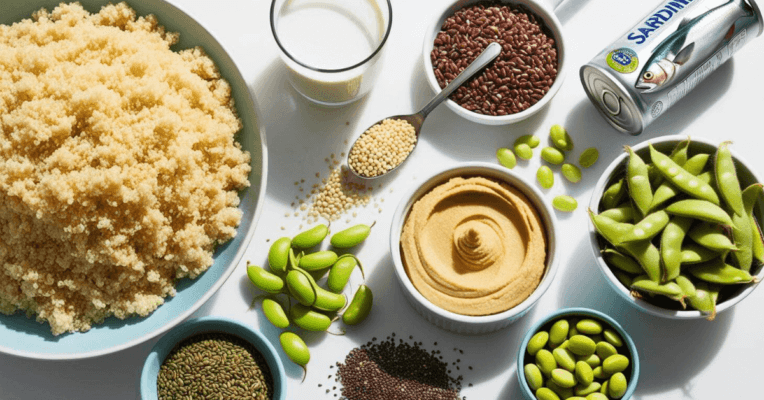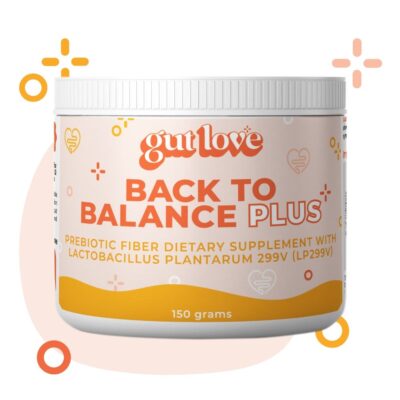Have you ever wondered about IBD-friendly protein sources that are a little more outside the box? Building up your protein levels doesn’t have to be hard and it doesn’t have to only be chicken & rice.
Protein has taken social media by storm, with some people saying that counting their daily intake feels like a new hobby or part-time job!
But when you’re managing Inflammatory Bowel Disease (IBD), protein isn’t just about hitting a number—it actually plays a crucial role in healing, maintaining muscle mass, and supporting immune function.
IBD-Friendly Protein Sources
Many traditional protein sources, like red meat and dairy, may be more difficult to tolerate in flares. Plus meat and dairy are also sources of protein we recommend to have less of in general with IBD.
To aim to support the gut’s bacterial balance and to follow a more anti-inflammatory meal pattern, we encourage our patients to include more plants and omega-3 rich fish.
Fortunately, there are plenty of anti-inflammatory, nutrient-dense alternatives that can help you meet your protein needs AND provide the gut with more friendly gut bacteria which is associated with a more diverse gut microbiome. In this article we list out our top 8 unconventional and IBD-friendly protein sources.
In today’s blog, we’ll dive into what protein is, why it’s essential for IBD, and explore unconventional, anti-inflammatory protein sources that you may not have considered before!
What is protein and why do we need it in IBD?
Protein, carbohydrates, and fat are macronutrients that are essential for all bodily functions. We recommend a balance of all of them to ensure nutrition needs are being met. But why has protein taken the internet by storm?
Protein is an important component when one’s goals are weight loss and building muscle. It is highly satiating, and plays a key role in building and repairing muscle when active. Plus protein helps ensure our muscles stay strong as we age.
However, for individuals with IBD, protein has an even greater role beyond muscle growth and satiety—it is critical for healing and recovery.
The Deeper Need for More Protein in IBD
IBD is a chronic condition that increases the body’s protein needs due to ongoing inflammation, periods of malabsorption, and the increased energy demand during flares.
Additionally, corticosteroid use, a common treatment for IBD, can contribute to muscle breakdown, making adequate protein intake even more essential.
The most common type of malnutrition in IBD patients is protein-energy malnutrition, which occurs when protein intake or absorption is inadequate to meet the body’s needs.
Malnutrition can lead to a decline in muscle mass and function, which may further progress to sarcopenia—a condition characterized by significant muscle loss, weakness, and reduced physical function (1).
Consuming adequate amounts of protein in IBD is essential for:
- Tissue repair and healing – Chronic inflammation can cause damage to the gut lining, and protein helps to provide the building blocks for repair.
- Maintaining muscle mass – Preventing muscle loss is crucial, especially during flares, hospitalizations, or prolonged steroid use.
- Supporting immune function – A strong immune system relies on proteins to produce antibodies and support immune cell function. Antibodies fight foreign substances in the body (like viruses and bacteria) and help protect the body against disease.
- Managing inflammation – Some protein sources contain beneficial compounds that help regulate inflammation, like the ones we will discuss in this blog!
While traditional protein sources like meat, eggs, and dairy first come to mind for many when they think of protein, they may not always be well-tolerated. Fortunately, there are many unconventional, anti-inflammatory protein sources that can help those with IBD meet their protein needs.
Curious as to how much protein you need in your day? Check out our Youtube!
In the next section, we’ll explore these unique protein options that provide both nourishment and inflammation-fighting benefits.
Unconventional & IBD-friendly Protein Sources
Now that you have an understanding of why protein is important for IBD, check out our unconventional protein packed foods for IBD below!
Quinoa
8 grams protein per 1 cup: swap out your usual rice dish for extra protein with quinoa. TIP: if you are new to quinoa, consider adding ¼ cup to ¾ cup of rice and mix to build your tolerance to it over time.
Soy milk
8 grams protein per 1 cup: a great addition to smoothies, oatmeal, matcha latte, or as an afternoon snack with nut butter and fruit.
Sacha Inchi Seeds
8 grams protein per 1 oz. (~2 Tbsp.): add seeds (or have as a nut butter) to smoothie, over oats or salads, or as a snack with dark chocolate.
Edamame
17 grams protein per 1 cup: add edamame to salmon bowls, saute with your favourite veggies, or mashe/puree with your morning avocado toast for an added boost of protein and fiber.
Canned Sardines
20 grams protein per can: you may have known that canned fish has a significant amount of protein, but in our practice, people rarely come to us eating sardines as a gut friendly and protein packed food. Canned sardines are not only a great source of protein, they are also a source of calcium, vitamin D, and omega-3s!
Hemp Hearts
10 grams protein per 3 Tbsp.: add hemp hearts to smoothies, oats, homemade energy bites, and salads for a good source of protein and omega-3s! Hemp hearts have a soft texture making them easy on the belly.
Chia Seeds
5 grams protein per 1 oz. (~2 Tbsp.): These nutritious seeds pack nearly 10 grams fibre per serving and are a source of magnesium, zinc, calcium, iron, and omega-3s. They also contain antioxidants to help the body fight disease and may also be helpful in lower cholesterol levels. Add chia seeds to oats or smoothies or make your own chia seed pudding. Blending them can help improve tolerance over time and can improve the texture for those who aren’t a fan of the gumminess.
Hummus
9-10 grams protein per ½ cup: add hummus to crackers, sandwiches, toast, or drizzled over your favourite veggies. Hummus is a great source of soluble fiber which can be helpful in slowing the bowels down and improving bowel consistency.
Why include these unconventional protein sources for IBD?
Stacking proteins at each meal and snack is a helpful way to ensure your protein needs are being met AND is a great way to add flavor, variety, and beneficial bacteria to your gut and meals!
Not only are a lot of the sources above higher in protein, many of them contain omega-3 fatty acids (like canned sardines, hemp hearts, chia seeds, and sacha inchi seeds) which help fight inflammation in the body by decreasing pro-inflammatory cytokines (2).
You may have noticed that fiber is in most of the protein sources above as well. The fiber in plants helps to provide an anti-inflammatory effect on the body by creating short-chain fatty acids like butyrate when fermented by the colon. If you’re curious about reading more on fiber and IBD, we have a helpful blog here that breaks down the importance of it for IBD.
Final Thoughts
Protein plays a vital role in fuelling the body during flares and malnutrition. Plus protein plays a supportive role in gut healing, helping with immune response, maintaining strength, and repleting energy levels.
While the typical North American protein sources may not always be the most supportive of the gut, exploring unconventional protein-packed options can help you meet your needs and provide the body with more anti-inflammatory support with the addition of omega-3s and fibre!
Finding the right balance of incorporating these unconventional IBD-friendly protein sources (and fibrous) foods for IBD may take some time but small, sustainable changes can make a big difference in how you feel in the long run.
If you or someone you know is looking for more support on prioritizing protein, discovering their food triggers, and decreasing uncomfortable gut symptoms we can help! Schedule a call now to discuss how The Crohn’s and Colitis Dietitians can support your IBD nutrition journey.
References
- Li Q, Wang J. The Effect of Protein Nutritional Support on Inflammatory Bowel Disease and Its Potential Mechanisms. Nutrients. 2024 Jul 17;16(14):2302. doi: 10.3390/nu16142302. PMID: 39064745; PMCID: PMC11280054.
- Calder, P. C. (2006). n−3 Polyunsaturated fatty acids, inflammation, and inflammatory diseases. The American Journal of Clinical Nutrition, 83(6). https://doi.org/10.1093/ajcn/83.6.1505s







This is really helpful!
Thank you! Happy to hear that.
AS a many year ulcerative colitis sufferer, I do fine with meat and dairy but cannot tolerate hummus or any beans.
Happy to hear you are doing well. This isn’t referring to tolerance but more so dietary patterns that increase and decrease risk of inflammation and flare ups (which aren’t reflected by symptoms alone).